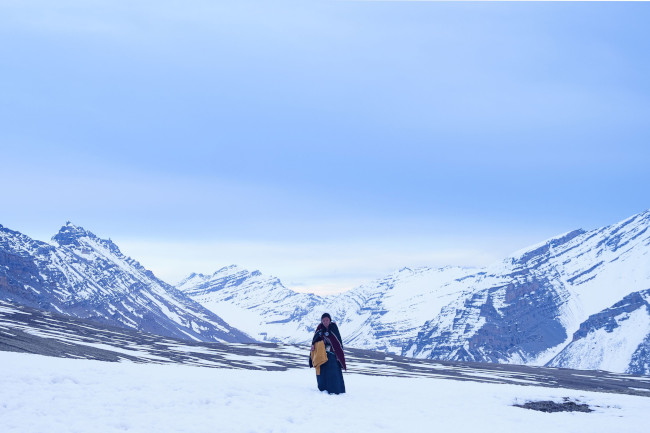By Sascha Krieger
Shambhala (Competition / Nepal, France, Norway, Hong Kong – China, Turkey, Taiwan, United States, Qatar / Director: Min Bahadur Bham)
In a remote Nepalese village, Pema marries three brothers, as is traditional. After the one she loves goes away on a long trade trip, rumours spread. When he does not return, the pregnant woman sets out a journey that becomes that of her life. Shambhala follows her at the speed of the world in which modern life is only hinted at in the watches the men wear and the teacher’s jacket. Religion, tradition and patriarchy unite in a web of expectations and assigned roles that are impossible to escape from. Stubbornly, dignified and seriously she follows her path wherever it might lead her, slowly taking control over her life, her family, her independence, while acknowledging the foundation tradition and culture has built. She accepts her life without giving it up. This quiet, magnificently photographed and exquisitely paced film, in which the natural and the mythical and mystical are only ever a short way apart, creates its own time and lives by its own speed brings alive a world entirely alien to most of its audience, its rules, its hardship – and celebrates the resilience and dignity of this, of all women. A late Competition highlight.

Mãos no fogo (Encounters / Portugal / Director: Margarida Gil)
A young film maker comes to an house in Portugal’s Douro region to film a documentary on the region’s great houses. It is an odd set-up: a snobbish „master“, two orphaned children, a gouverness, a cook, the girl next door and her deranged father. What ensues is a series of tableaux of the mysterious, a pseudo-gothic house of horrors. There are alway two levels of images: those we see and those she creates and films. Later, a third will be added. Facial expressions derive from silent film or classic horror fare, the „mystery“ is never disclosed, open ends paraded before us, before the film ends on fragmented set-ups that could be more or less masterful paintings (mostly less). Pathos-filled piano music fills the air, any attempt at a stringent story or narrative is abandoned as much-proclaimed search for truth descends in to pseudo-smart would-be philosophical exchanges that accentuate the ridiculousness if the over-the top B-movie acting. What we see isn’t always what is real, it can mislead, even manipulate us. This much we know before this pretentious piece of nothing.
Supersex – Episodes 1-3 (Berlinale Special / Italy / Creator: Francesca Manieri (Creator) / Directors: Matteo Rovere, Francesco Carrozzini, Francesca Mazzoleni)
The Italian TV miniseries Supersex follows the life and career of famous porn star Rocco Siffredi who has worked in hundreds of productions since the 1980s as well as a producer and director and is a well-known star in Italy. The series starts with his temporary retirement in 2004 which the episode frames as being caused by demons haunting him from his family past. The series is told through Siffredis eyes, he also acts as a narrator. The family history is at the core of it all, sex his superpower allowing him to overcome his past, his enemies and himself. While the beginning is painted in the sugary colours of an average Italian coming of age film, episodes two and three rely on the twin pair of violence and sex, assuming a more and more voyeuristic approach. The age jumps between the three actors playing Rocco are hard to believe, pushing realism even further into the background. Saul Nanni plays a young Rocco, starting to find his „superpower“ and through it confidence, while Alessandro Borghi’s older version repeatedly drifts into its own parody. Everything is a little on the nose, effect triumphs over characterisation, subtlety gives way to an over-the-top simplification perhaps inspired by the comic-book-like Supersex character Rocco discovers as a child. It can only be hoped that later episodes focus more on character and story development – the first four mainly mean to draw attention and provoke. Which they rarely do.
Crossing (Panorama / Sweden, Denmark, France, Turkey, Georgia / Director: Levan Akin)
After her sister dies, Lia sets out to look for her daughter Tekla, a trans woman who was kicked out by her family when she came out. Joined by an unlikely travel companion, she goes to Istanbul in an impossible quest to find someone in that bustling metropolis who might wenn not want to be found. Their paths cross with Evrim, a trans lawyer struggling with acceptance wherever she goes. In grainy naturalist pictures, often filmed with a hand-held camera and painted with a reduced palette, Crossing develops from a road trip depicting the slowly blossoming friendship between a hardened older woman and an aimless young men into a story about identity, invisibility, ostracisation and solidarity. It depicts the struggles trans people face in Turkey’s everyday life but also how they bond together, support each other even when struggling for survival. In their harsh empathy they mirror Lia who herself struggles with guilt as she didn’t support her niece when she came out. as they drift through the Istanbul days and increasingly nights, a common sense of humanity emerges, subtly, randomly naturally. There are no grandiose gestures of acceptance or forgiveness just a matter-of-fact realisation of each others struggles and needs. The ambivalent ending should not be spoilt but it perfectly rounds up a film that never never points its finger, that never makes a bold statement, it just does what film does best: make people, make lives visible, help them emerge from the shadows, the edges of society, give them voices, tell their stories. A quiet, drily funny and deeply moving little masterpiece.